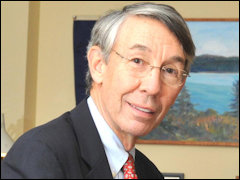For decades, Stephen S. Fuller has been regarded as a regional asset.
His study of the state’s economy as a professor at George Mason University has been praised as insightful, especially his idea that Virginia needs to diversify from its traditional reliance on federal government spending.
So, it seemed odd that Fuller, who plans to retire in the near future, would get mired in a minor controversy over the ethics of an opinion piece he wrote for a local business newspaper.
One couldn’t ask for a more loaded sense of circumstances. Retail giant Amazon, which is building its second headquarters near Reagan National Airport with a payroll of thousands of people, wanted Fuller to write and pitch a story extolling the virtues of the multi-billion dollar project.
Amazon’s public relations people wanted the article out before the Arlington Board of Supervisors was due to consider $23 million in incentives for the plan in March.
Fuller agreed and made one bad mistake. He showed a draft of the work to Amazon and asked for their comments. He got some, rejected them and then tried to pitch it to the Opinions Section of The Washington Post.
That’s plenty sticky since Amazon owner Jeff Bezos also personally owns the Post, which has to tread water very carefully when any issues about Amazon and Bezos come up. According to a Post news story, its opinions editors turned the piece down without giving a reason (full disclosure: I occasionally contribute to the section).
Then, Fuller went to the Washington Business Journal without telling them about having shown Amazon a draft. They published it but later, Journal Editor in chief Vandana Sinha said they’d have handled it differently had they known that Amazon had had such an unusually close involvement with the story’s development.
There’s more baggage as well. George Mason University is widely regarded for hiring professors and funding programs with a conservative point of view, thanks to early and often financial support from Charles and David Koch, ultra-rich conservatives with a libertarian strain.
They bankrolled GMU’s Mercatus Center, which claims it is dedicated to “free market” ideas in economics. Unlike other right-wing schools such as Lynchburg’s Liberty University, GMU does not get much involved in social policy such as abortion or gay marriage. Rather, it pushes less government regulation, low taxes and less government involvement in business development.
That alone is curious since Fuller’s piece was being used to promote government involvement in a private project but this kind of contradiction is as old in Virginia as Natural Bridge.
The state has always turned to government incentives to push its economy. Let’s not even talk about military spending that makes Virginia or California (depending on who’s doing the figuring) the No. 1 defense industrial state. Forget the legions of civil servants whose generous and steady salaries fuel housing sales, schools and stores.
We’ve been through the tobacco commission that has shuffled millions in public money to questionable projects (including helping build the infrastructure of the private Liberty University). We’ve had the state consider an unneeded $450 million highway from Petersburg to Suffolk along with publicly-funded boosterism from a Richmond economic analysis firm.
For years, the Virginia Economic Development Partnership shuffled millions of public funds out the door to startup projects with all but zero checks until the practice was put to a halt a few years back.
Although Fuller has been highly regarded for his ethics, he stumbled into the familiar Virginia whirl-a-gig of inside baseball, less than full transparency and back room manipulation.
Even more ironic is that George Mason University, the supposed hallmark of honest and muscular free market economics, it at the center of this small, but interesting, mess.



